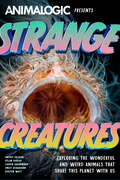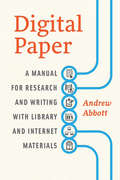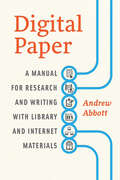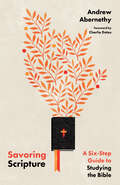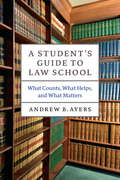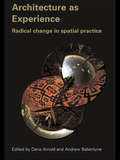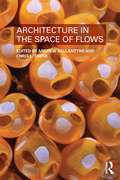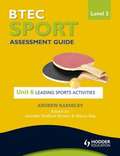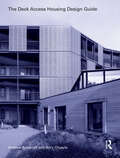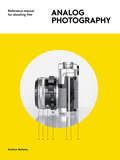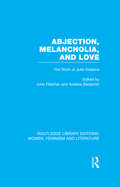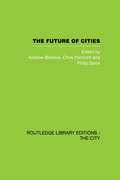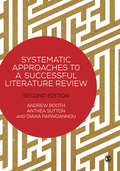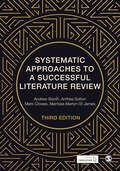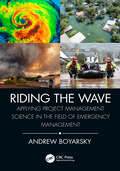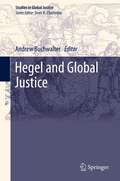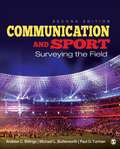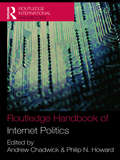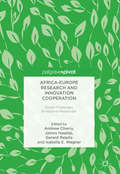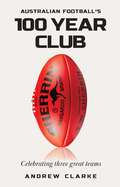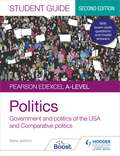- Table View
- List View
Strange Creatures: Exploring the Wonderful and Weird Animals that Share this Planet with Us (Animalogic Presents)
by Andres SalazarLearn about the most beautiful and unusual creatures, all in one incredible animal encyclopedia for adults. Cool animals, fascinating facts. From the hognose snake to the mudskipper, you will learn all about the wacky and wonderful animals that walk, run, swim, and slither all over our magnificent planet. In Strange Creatures, you will get a deeper look into the lives of these glorious animals and learn how connected they are to the world we live in. A book of wild animals living remarkable lives. Step outside of your own world and into the world of Strange Creatures. Look through the eyes of the banana slug, understand how the wolf eel lives, and find out what separates a glow worm from a velvet worm. Discover the eccentric creatures around us and gain a greater view of our world. Inside, you&’ll find: Strange facts about animals that will ignite a passion for cool critters and wow-worthy wildlife A new way to expand your knowledge by learning about a different type of animal every chapter A different perspective on the world through these wonderfully weird animals and their lively stories If you liked Zoology: Inside the Secret World of Animals, Knowledge Encyclopedia, or Coyote Peterson&’s Brave Adventures, you&’ll love Strange Creatures.
Study Guide for the National Counselor Examination and CPCE
by Andrew A. HelwigThe Study Guide for the National Counselor Examination and CPCE has been revised and updated. Over 400 pages long, the study guide covers the eight CACREP content areas found on the NCE, CPCE, and many similar exams. There are revisions throughout this edition and new material has been added in the following areas: relational-cultural theory, changes in workforce trends, value conflicts between counselors and clients, HIPAA updates, initiatives in licensure portability, societal stress and the opioid crisis, and updates in the use of technology in distance counseling. The Study Guide includes two practice exams, study tips, test taking strategies, the ACA Code of Ethics and additional exam prep resources. Because the information in the eight content areas is double-spaced, with considerable outlining of material and the BOLDING of important concepts, the study material is manageable and the book is user-friendly.
Digital Paper: A Manual for Research and Writing with Library and Internet Materials
by Andrew AbbottToday’s researchers have access to more information than ever before. Yet the new material is both overwhelming in quantity and variable in quality. How can scholars survive these twin problems and produce groundbreaking research using the physical and electronic resources available in the modern university research library? In Digital Paper, Andrew Abbott provides some much-needed answers to that question. Abbott tells what every senior researcher knows: that research is not a mechanical, linear process, but a thoughtful and adventurous journey through a nonlinear world He breaks library research down into seven basic and simultaneous tasks: design, search, scanning/browsing, reading, analyzing, filing, and writing. He moves the reader through the phases of research, from confusion to organization, from vague idea to polished result. He teaches how to evaluate data and prior research; how to follow a trail to elusive treasures; how to organize a project; when to start over; when to ask for help. He shows how an understanding of scholarly values, a commitment to hard work, and the flexibility to change direction combine to enable the researcher to turn a daunting mass of found material into an effective paper or thesis. More than a mere how-to manual, Abbott’s guidebook helps teach good habits for acquiring knowledge, the foundation of knowledge worth knowing. Those looking for ten easy steps to a perfect paper may want to look elsewhere. But serious scholars, who want their work to stand the test of time, will appreciate Abbott’s unique, forthright approach and relish every page of Digital Paper.
Digital Paper: A Manual for Research and Writing with Library and Internet Materials (Chicago Guides to Writing, Editing, and Publishing)
by Andrew AbbottToday’s researchers have access to more information than ever before. Yet the new material is both overwhelming in quantity and variable in quality. How can scholars survive these twin problems and produce groundbreaking research using the physical and electronic resources available in the modern university research library? In Digital Paper, Andrew Abbott provides some much-needed answers to that question. Abbott tells what every senior researcher knows: that research is not a mechanical, linear process, but a thoughtful and adventurous journey through a nonlinear world. He breaks library research down into seven basic and simultaneous tasks: design, search, scanning/browsing, reading, analyzing, filing, and writing. He moves the reader through the phases of research, from confusion to organization, from vague idea to polished result. He teaches how to evaluate data and prior research; how to follow a trail to elusive treasures; how to organize a project; when to start over; when to ask for help. He shows how an understanding of scholarly values, a commitment to hard work, and the flexibility to change direction combine to enable the researcher to turn a daunting mass of found material into an effective paper or thesis. More than a mere how-to manual, Abbott’s guidebook helps teach good habits for acquiring knowledge, the foundation of knowledge worth knowing. Those looking for ten easy steps to a perfect paper may want to look elsewhere. But serious scholars, who want their work to stand the test of time, will appreciate Abbott’s unique, forthright approach and relish every page of Digital Paper.
Savoring Scripture: A Six-Step Guide to Studying the Bible
by Andrew AbernethySome books on how to read the Bible are academically informative, but their rationality can make God seem distant.andPostureFlowContextWhole BibleSavor GodFaithful responseChapters provide guidance on interpreting biblical genres, factoring in historical backgrounds, reading each passage in context, tracing the redemptive storyline of Scripture, and more. Then, building on a strong grasp of Scripture's meaning, readers engage the traditional practice of lectio divina and consider how to respond faithfully to the text. The goal, Abernethy says, is to encounter God and to be shaped by the Word as we savor its richness.Savoring Scripture
A Student's Guide to Law School: What Counts, What Helps, and What Matters (Chicago Guides To Academic Life Ser.)
by Andrew B. AyersLaw school can be a joyous, soul-transforming challenge that leads to a rewarding career. It can also be an exhausting, self-limiting trap. It all depends on making smart decisions. When every advantage counts, A Student’s Guide to Law School is like having a personal mentor available at every turn. As a recent graduate and an appellate lawyer, Andrew Ayers knows how high the stakes are—he’s been there, and not only did he survive the experience, he graduated first in his class. In A Student’s Guide to Law School he shares invaluable insight on what it takes to make a successful law school journey. Originating in notes Ayers jotted down while commuting to his first clerkship with then-Judge Sonia Sotomayor, and refined throughout his first years as a lawyer, A Student’s Guide to Law School offers a unique balance of insider’s knowledge and professional advice. Organized in four parts, the first part looks at tests and grades, explaining what’s expected and exploring the seven choices students must make on exam day. The second part discusses the skills needed to be a successful law student, giving the reader easy-to-use tools to analyze legal materials and construct clear arguments. The third part contains advice on how to use studying, class work, and note-taking to find your best path. Finally, Ayers closes with a look beyond the classroom, showing students how the choices they make in law school will affect their career—and even determine the kind of lawyer they become. The first law school guide written by a recent top-ranked graduate, A Student’s Guide to Law School is relentlessly practical and thoroughly relevant to the law school experience of today’s students. With the tools and advice Ayers shares here, students can make the most of their investment in law school, and turn their valuable learning experiences into a meaningful career.
Architecture as Experience: Radical Change in Spatial Practice
by Dana Arnold Andrew BallantyneArchitecture as Experience investigates the perception and appropriation of places across intervals of time and culture. The particular concern of the volume is to bring together fresh empirical research and animate it through contact with theoretical sophistication, without overwhelming the material. The chapters establish the continuity of a particular physical object and show it in at least two alternative historical perspectives, in which recognisable features are shown in different lights. The results are often surprising, inverting the common idea of a historic place as having an enduring meaning. This book shows the insight that can be gained from learning about earlier constructions of meaning which have been derived from the same buildings that stand before us today.
Architecture in the Space of Flows
by Chris L. Smith Andrew BallantyneTraditionally, architecture has been preoccupied with the resolution of form. That concern helps to make photogenic buildings, which have received a great deal of attention. This book looks instead at the idea of the flows, which connects things together and moves between things. It is more difficult to discuss, but more necessary, because it is what makes things work. Architects have to think about flow – the flow of people through buildings, the flow of energy into buildings, and waste out of them – but usually the effects of flow do not find expression. The essays gathered here present a collection of exploratory ideas and offer an understanding of buildings, people and settlements through concepts of flow.
BTEC First Sport Level 2 Assessment Guide: Unit 6 Leading Sports Activities
by Andrew BardsleyTake the guesswork out of BTEC assessment with sample student work and assessor feedback for all pass, merit and distinction criteria.By focusing on assessment this compact guide leads students through each pass, merit and distinction criterion by clearly showing them what they are required to do.- Provides a sample student answer for every single pass, merit and distinction criterion, together with detailed assessor's comments on how work can be improved, so that students know exactly what their work needs to show to hit their grade target - Saves you time - realistic model assignments are included and provide an opportunity to generate all evidence, with each criterion and grade clearly indicated, so there is no need to rewrite yet more assignment briefs- Use instead of a textbook - detailed revision-style summaries of all the learning aims from the unit support students, allowing them to quickly find the facts and ideas they will need for their assessment- Enables you to customise your course - combine this guide with others in the series so you only pay for the units you deliver
The Deck Access Housing Design Guide: A Return to Streets in the Sky
by Andrew Beharrell Rory OlcaytoThe Deck Access Housing Design Guide is the first practical design guide to deck access housing. It focuses on the contemporary use of deck access housing, sharing practical guidance and providing in-depth case studies, while also presenting historical context about this flexible and evolving housing type. Despite a chequered history that saw it linked with urban decay and social malaise in the 1970s and 80s, deck access housing today, after a 40-year hiatus, is fast becoming the default solution for mid-rise housing in the UK, and London in particular. This is in part down to architects’ renewed interest in post-war Modernist typologies, but also due to specific planning standards that favour the qualities – dual-aspect plans, ‘public’ front doors – of deck access design. This comprehensive, professional guide spotlights the best contemporary deck access housing in the UK and throughout mainland Europe, explaining and analysing exemplars in detail. Illustrated in full colour throughout with plans, elevations, photographs, project data and annotations, case studies include both new build and retrofit projects, in public housing, co-housing and Third Age residential projects. Good architectural practice flows from an informed understanding of cultural and design history coupled with practical guidance and clear analysis of case studies. That is what this book provides for anyone interested in, or involved in the design and delivery of, deck access housing. Featured architects from the UK: AHMM · Apparata · Cartwright Pickard · Collective Architecture · DO Architecture · Hawkins Brown · Haworth Tompkins · Henley Halebrown · Levitt Bernstein · Maccreanor Lavington · Mæ · Matthew Lloyd · Pitman Tozer · Pollard Thomas Edwards · Proctor & Matthews · PRP · RCKa Featured architects from mainland Europe: ANMA · Arquitectura Produccions · Atelier Kempe Thill · Bureau Massa · DAMAST · Estudio Herreros · Fink + Jocher · KAAN · LEVS · Martin-Löf · MEF · Muñoz Miranda · Passelac & Roques · Waechter + Waechter
Analog Photography: Reference Manual for Shooting Film
by Andrew BellamyAttracted by the image quality, the tactile joy of a finely made camera, and the affordable prices of vintage equipment, photographers around the world are rediscovering the joys of manual photography. This comprehensive guide to shooting film photography covers all the bases, from setting up a camera through film processing. In a convenient format, filled with diagrams, examples, and illustrations, Analog Photography is a portable reference tool for neophytes and experienced photographers alike. With an irresistible package inspired by the aesthetics of vintage user manuals, this is "a great-looking publication and a fantastic place from which to start, or rekindle, a journey into film photography" (Creative Review).
Abjection, Melancholia and Love: The Work of Julia Kristeva (Routledge Library Editions: Women, Feminism and Literature)
by John Fletcher Andrew BenjaminThis volume begins with a new essay by Julia Kristeva, ‘The Adolescent Novel’, in which she examines the relation between novelistic writing and the experience of adolescence as an ‘open structure’. It is this blend of the literary with the psychoanalytic that places Kristeva’s work central to current thinking, from semiotics and critical theory to feminism and psychoanalysis. The essays in this volume offer insight into the workings of Kristeva’s thought, ranging from her analyses of sexual difference, female temporality and the perceptions of the body to the mental states of abjection and melancholia, and their representation in painting and literature. Kristeva’s persistent humanity, her profound understanding of the dynamics of intention and creativity, mark her out as one of the leading theoreticians of desire. Each essay offers the reader a new insight into the many aspects that make up Kristeva’s entire oeuvre.
The Future of Cities
by Chris Hamnett Andrew Blowers Philip SarreThis collection of readings draws on material from a wide range of sources - from the past and present and from literature and technology - and is concentrated on the areas which seem most relevant to the planning of the future city - what is happening to the city and what we can do about it. The readings have been selected and organised to present the planning of the future city. This book was first published in 1974.
Systematic Approaches to a Successful Literature Review
by Andrew Booth Diana Papaioannou Anthea SuttonReviewing the literature is an essential part of every research project. This book takes you step-by-step through the process of approaching your literature review systematically, applying systematic principles to a wide range of literature review types. Through numerous examples, case studies and exercises, the book covers often neglected areas of literature review such as concept analysis, scoping and mapping. The book includes practical tools for supporting the various stages of the review process, including; - managing your literature review - searching the literature - assessing the quality of the literature - synthesising qualitative and/or quantitative data - writing up and presenting data Systematic Approaches to a Successful Literature Review is essential reading for any student or researcher looking to approach their literature review in a systematic way.
Systematic Approaches to a Successful Literature Review
by Andrew Booth Diana Papaioannou Anthea SuttonShowing you how to take a structured and organized approach to a wide range of literature review types, this book helps you to choose which approach is right for your research. Packed with constructive tools, examples, case studies and hands-on exercises, the book covers the full range of literature review techniques. New to This Edition: Full re-organization takes you step-by-step through the process from beginning to end New chapter showing you how to choose the right method for your project Practical guidance on integrating qualitative and quantitative data New coverage of rapid reviews Comprehensive inclusion of literature review tools, including concept analysis, scoping and mapping With an emphasis on the practical skills, this guide is essential for any student or researcher needing to get from first steps to a successful literature review.
Systematic Approaches to a Successful Literature Review
by Andrew Booth Anthea Sutton Mark Clowes Marrissa Martyn-St JamesWhether you are new to literature reviews or working with new types of data, this book takes the guesswork out of writing your literature review. From deciding how much literature to include to managing your data, assessing your sources, and writing results, it outlines a step-by-step process that works with any data. To help you choose best approach for your research, this book includes: · Worksheets and decision aids to help you plan and organise your literature review · Worked examples and case studies to show you what – and what not – to do in practice · Troubleshooting tips and answers to all your frequently asked questions · Online access to a literature review starter template, an exercise workbook, project diary template, and a source credibility checklist. The perfect project support for any social sciences student, this edition also includes a new chapter on analysing mixed methods research.
Systematic Approaches to a Successful Literature Review
by Andrew Booth Anthea Sutton Mark Clowes Marrissa Martyn-St JamesWhether you are new to literature reviews or working with new types of data, this book takes the guesswork out of writing your literature review. From deciding how much literature to include to managing your data, assessing your sources, and writing results, it outlines a step-by-step process that works with any data. To help you choose best approach for your research, this book includes: · Worksheets and decision aids to help you plan and organise your literature review · Worked examples and case studies to show you what – and what not – to do in practice · Troubleshooting tips and answers to all your frequently asked questions · Online access to a literature review starter template, an exercise workbook, project diary template, and a source credibility checklist. The perfect project support for any social sciences student, this edition also includes a new chapter on analysing mixed methods research.
Riding the Wave: Applying Project Management Science in the Field of Emergency Management (ISSN)
by Andrew BoyarskyEmergency managers and public safety professionals are more frequently being called on to address increasingly challenging and complex critical incidents, with a wider variety and intensity of hazards, threats, and community vulnerabilities. Much of the work that falls into the scope of emergency managers – prevention, preparedness, mitigation – is “blue sky planning” and can be contained and effectively managed within projects. This book provides a foundational project management methodology relevant to emergency management practice, and explains and demonstrates how project management can be applied in the context of emergency and public safety organizations.Special features include: an initial focus on risk assessment and identification of mitigation and response planning measures; a clear set of better practices, using a diverse set of examples relevant to today’s emergency environment, from projects to develop emergency response exercises to application development to hazard mitigation; a framework for managing projects at a strategic level and how to incorporate this into an organization’s program, and presents how to develop and manage an emergency program and project portfolio; and suitability as both a hands-on training guide for emergency management programs and a textbook for academic emergency management programs. This book is intended for emergency managers and public safety professionals who are responsible for developing emergency programs and plans, including training courses, job aids, computer applications and new technology, developing exercises, and for implementing these plans and components in response to an emergency event. This audience includes managers in emergency and first response functions such as fire protection, law enforcement and public safety, emergency medical services, public health and healthcare, sanitation, public works, business continuity managers, crisis managers, and all managers in emergency support functions as described by FEMA. This would include those who have responsibility for emergency management functions, even without the related title.
Hegel and Global Justice
by Andrew BuchwalterHegel and Global Justice details the relevance of the thought of G.W.F. Hegel for the burgeoning academic discussions of the topic of global justice. Against the conventional view that Hegel has little constructive to offer to these discussions, this collection, drawing on the expertise of distinguished Hegel scholars and internationally recognized political and social theorists, explicates the contribution both of Hegel himself and his "dialectical" method to the analysis and understanding of a wide range of topics associated with the concept of global justice, construed very broadly. These topics include universal human rights, cosmopolitanism, and cosmopolitan justice, transnationalism, international law, global interculturality, a global poverty, cosmopolitan citizenship, global governance, a global public sphere, a global ethos, and a global notion of collective self-identity. Attention is also accorded the value of Hegel's account of mutual recognition for analysing themes in global justice, both as regards the politics of recognition at the global level and the conditions for a general account of relations of people and persons under conditions of globalization. In exploring these and related themes, the authors of this book regularly compare Hegel to others who have contributed to the discourse on global justice, including Kant, Marx, Rawls, Habermas, Singer, Pogge, Nussbaum, Appiah, and David Miller.
Communication and Sport: Surveying the Field, Second Edition
by Andrew C. Billings Michael L. Butterworth Paul D. TurmanThe Second Edition of Communication and Sport: Surveying the Field offers the most comprehensive and diverse approach to the study of communication and sport available at the undergraduate level. Newly expanded to incorporate the latest topics and perspectives in the field, the New Edition examines a wide array of topics to help readers understand important issues such as sports media, rhetoric, culture, and organizations from both micro- and macro- perspectives. Everything from youth to amateur to professional sports is addressed in terms of mythology, community, and identity; issues such as fan cultures, racial identity and gender in sports media, politics and nationality in sports, and sports and religion are explored in depth, and provide useful, applied insight for readers. Practical and relevant, epistemologically diverse, and theoretically grounded, the Second Edition of Billings, Butterworth, and Turman’s text keeps readers on the cutting-edge.
Routledge Handbook of Internet Politics
by Philip N. Howard Andrew ChadwickThe politics of the internet has entered the social science mainstream. From debates about its impact on parties and election campaigns following momentous presidential contests in the United States, to concerns over international security, privacy and surveillance in the post-9/11, post-7/7 environment; from the rise of blogging as a threat to the traditional model of journalism, to controversies at the international level over how and if the internet should be governed by an entity such as the United Nations; from the new repertoires of collective action open to citizens, to the massive programs of public management reform taking place in the name of e-government, internet politics and policy are continually in the headlines. The Routledge Handbook of Internet Politics is a collection of over thirty chapters dealing with the most significant scholarly debates in this rapidly growing field of study. Organized in four broad sections: Institutions, Behavior, Identities, and Law and Policy, the Handbook summarizes and criticizes contemporary debates while pointing out new departures. A comprehensive set of resources, it provides linkages to established theories of media and politics, political communication, governance, deliberative democracy and social movements, all within an interdisciplinary context. The contributors form a strong international cast of established and junior scholars. This is the first publication of its kind in this field; a helpful companion to students and scholars of politics, international relations, communication studies and sociology.
Africa-Europe Research and Innovation Cooperation: Global Challenges, Bi-regional Responses
by Andrew Cherry James Haselip Gerard Ralphs Isabella E. Wagner<P>This edited volume is concerned with the evolution and achievements of cooperation in research and innovation between Africa and Europe, and points to the need for more diversified funding and finance mechanisms, and for novel models of collaboration to attract new actors and innovative ideas. <P>It reflects on the political, economic, diplomatic and scientific rationale for cooperation, while also examining practical developments, illustrated with examples, in the fields of food security, health, and climate change. <P>The need to mobilise scientific knowledge and to ensure equality and fairness in the cooperation are recurrent themes. Africa-Europe Cooperation in Research and Innovation is essential reading for policy makers and researchers in international relations and science diplomacy.
Australian Football's 100 year club
by Andrew ClarkeThe parallel histories of three centenary AFL clubs: Hawthorn, North Melbourne and the Western Bulldogs.Three AFL football clubs. Three centenaries. Three very different histories. AFL stalwart clubs Hawthorn, North Melbourne and the Western Bulldogs all joined the league in 1925. The trio have shared an intertwined history over the ensuing century – and vastly contrasting fortunes on and off the field. Australian Football's 100 Year Club celebrates the centenaries, plotting the ebb and flow experienced by each popular club. Author Andrew Clarke explores both their successes and the hard times, recounting the social histories that helped shaped these three teams. A must for any AFL fan.
Pearson Edexcel A-level Politics Student Guide 2: Government and Politics of the USA and Comparative Politics Second Edition
by Eric Magee Andrew Colclough Sarra JenkinsThis Student Guide will help you to:* Identify key content for the exams with our concise coverage of topics* Avoid common pitfalls with clear definitions and exam tips throughout* Reinforce your learning with bullet-list summaries at the end of each section* Make links between topics with synoptic links highlighted throughout* Test your knowledge with rapid-fire knowledge check questions and answers* Find out what examiners are looking for with our Questions & Answers section
Pearson Edexcel A-level Politics Student Guide 2: Government and Politics of the USA and Comparative Politics Second Edition
by Eric Magee Andrew Colclough Sarra JenkinsThis Student Guide will help you to:* Identify key content for the exams with our concise coverage of topics* Avoid common pitfalls with clear definitions and exam tips throughout* Reinforce your learning with bullet-list summaries at the end of each section* Make links between topics with synoptic links highlighted throughout* Test your knowledge with rapid-fire knowledge check questions and answers* Find out what examiners are looking for with our Questions & Answers section
